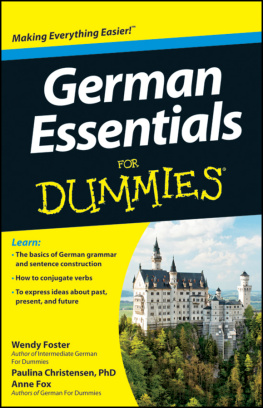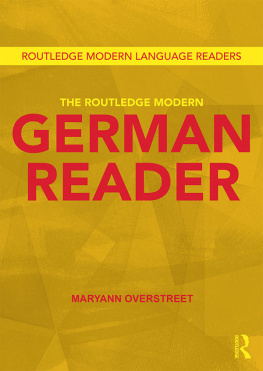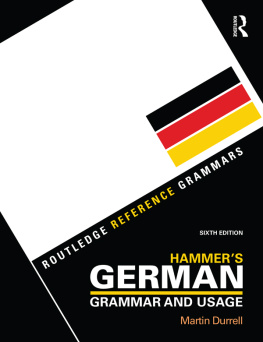German Reading Skills for Academic Purposes
German Reading Skills for Academic Purposes allows researchers and learners with no prior understanding of German to gain an understanding of written German at CEFR C2/ACTFL Intermediate-High level that will allow them to read a variety of German texts, including research articles and monographs.
This is achieved by looking closely at the elements of German grammar required for the understanding of written German along with practical advice and observations.
One of the main themes running through the textbook is that it uses a toolkit approach that puts deductive reasoning and decoding skills at its heart to allow learners to engage with a wide variety of texts.
Alexander Burdumy is Assistant Professor of German at the University of Durham, UK.
German Reading Skills for Academic Purposes
Alexander Burdumy

First published 2019
by Routledge
2 Park Square, Milton Park, Abingdon, Oxon OX14 4RN
and by Routledge
52 Vanderbilt Avenue, New York, NY 10017
Routledge is an imprint of the Taylor & Francis Group, an informa business
2019 Alexander Burdumy
The right of Alexander Burdumy to be identified as author of this work has been asserted by him in accordance with sections 77 and 78 of the Copyright, Designs and Patents Act 1988.
All rights reserved. No part of this book may be reprinted or reproduced or utilised in any form or by any electronic, mechanical, or other means, now known or hereafter invented, including photocopying and recording, or in any information storage or retrieval system, without permission in writing from the publishers.
Trademark notice : Product or corporate names may be trademarks or registered trademarks, and are used only for identification and explanation without intent to infringe.
British Library Cataloguing-in-Publication Data
A catalogue record for this book is available from the British Library
Library of Congress Cataloging-in-Publication Data
A catalog record has been requested for this book
ISBN: 978-0-367-18662-3 (hbk)
ISBN: 978-0-367-18663-0 (pbk)
ISBN: 978-0-429-19748-2 (ebk)
Typeset in Sabon
by Deanta Global Publishing Services, Chennai, India
Contents
I would like to thank the following publishers and authors for permission to reproduce the following copyright texts:
- Hintergrnde zum Weltbevlkerungswachstum, an adapted selection of texts from the website of the charity organisation Deutsche Stiftung Weltbevlkerung , found at https://www.dsw.org.
- Die Zsur des Mauerbaus 1961, excerpt from: Burdumy, Alexander (2013). Sozialpolitik und Repression in der DDR . Ost-Berlin 19711989 . Klartext Verlag. pp. 8182.
- Glck im Unglck, an adapted excerpt from: Bnisch, Georg (2008). Glck im Unglck. In SPIEGEL SPECIAL Geschichte. Der Kalte Krieg. Wie die Welt das Wettrsten berlebte. 3/2008. Spiegel Verlag. pp. 2433.
- Ablasshandel, from the website Der Luther-Tetzel-Weg , found at www.luther-tetzel-weg.de; originally published by Kirchengemeinde St. Nikolai Jterbog & Pfarrer Bernhard Gutsche.
- Wenn die Haifische Menschen wren, from: Brecht, Bertolt (1995). Werke. Groe kommentierte Berliner und Frankfurter Ausgabe, Band 18: Prosa 3. Bertolt-Brecht-Erben/Suhrkamp Verlag.
- Ich habe doch nichts zu verbergen, excerpt from: Morozov, Evgeny (2015). Ich habe doch nichts zu verbergen. In Aus Politik und Zeitgeschichte, 11-12/2015. BPB. pp. 3-7.
The original can be found here:
http://www.bpb.de/shop/zeitschriften/apuz/202251/big-data (accessed 10/02/2019).
- Von den 95 Thesen zum Augsburger Religionsfrieden, excerpt from: Kaufmann, Thomas (2016). Meilensteine der Reformation. Von den 95 Thesen zum Augsburger Religionsfrieden. In Aus Politik und Zeitgeschichte 52/2016 . BPB. pp. 814.
The original can be found here:
http://www.bpb.de/shop/zeitschriften/apuz/239253/reformation (accessed 10/02/2019).
This book represents in many ways a labour of love and is dedicated to those who want to learn how to read German.
When I started working at the University of Durham, I had not yet encountered courses that were focused solely on learning how to read a German text. Over the years I have been fortunate to meet many learners from different disciplines and at different stages in their education who wished to learn how to read German texts, sometimes for their research, sometimes for professional purposes, sometimes as a cross-disciplinary skill and sometimes for personal reasons such as further education.
With this book I try to support these learners the best that I can. In this book I combine a very hands-on approach by teaching students strategies and techniques to decode German texts with the help of a dictionary, an approach that I call the toolkit approach. When someone wants to build a house, they need the raw materials: the stones, mortar, timber, roof tiles and so on. In a language, this is the vocabulary. In order to build the house one needs tools and machines; in languages these are the grammatical rules that are used to bind the words together and lock them into a meaning. Yet there is one more important thing needed to build a house: the technical know-how. This is where this book differs from a typical grammar book. It provides a pathway to acquiring the know-how by building up rules and advice, and practice. Grammar points are ordered in a logical order, exercises strengthen understanding, and advice and tips help to make the process of understanding German easier.
I wish to thank especially Dr Gaby Wright, Mr Mark Critchley and Mrs Florelena Galvis for taking the time to help me with this book and for their helpful advice. I also want to thank all the students who over the years have given me valuable experience on the matter as well as feedback and advice on earlier versions of this book.
How to use this book
This book can be used for self-study, as a reference and as a course book.
The chapters are organised in a linear manner. For the most part there is no need to switch to other sections of the book and one can focus on advancing through all 16 chapters. There are four additional parts to the book; these are a section with additional practice texts, an appendix, an answer key and a vocabulary section. The appendix includes information that does not fit into any specific chapter, for example an explanation of grammatical terminology, a list of tricky words and constructions, advice on dictionaries and other helpful information.
Every chapter has at least one practice text attached to it in some form. For the most part, these are authentic text materials or based on authentic text material, and some of the recurring themes in texts, exercises and examples involve works by Schiller and Goethe, academia, the former GDR, Theology and Classicism. The answer key provides answers for self-study and there is also occasional additional advice in the answer key. Many texts and exercises have vocabulary sections directly beneath; as you progress through the book, these will become less comprehensive and frequent, but most words can still be found in the vocabulary section of the book.
One important piece of advice is to not rush through the early chapters. Most of the earlier chapters that cover a large deal of different content have summaries at the end be sure to review these. German has a high initial learning curve that gradually levels off, and as a result the early contain a lot of vital core information that first needs to be understood before the later chapters can be tackled. There is a little overlap of topics/content here and there (for example, for cases, sentence structure and for prepositions), to allow more advanced learners to jump to specific sections they want to work on. In general, when a topic is repeated, the first entry is simpler and more general, and the second one is more complex and in-depth.















